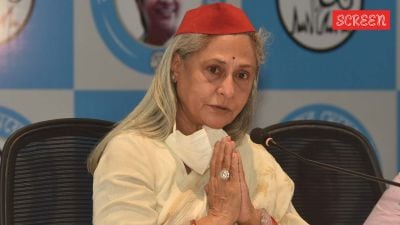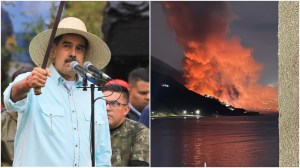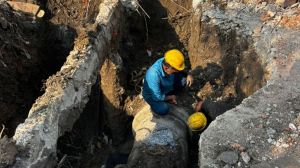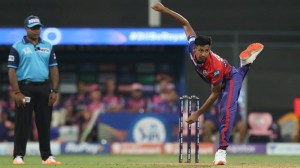The current protests are being called the GenZ protests, as many of its participants are under 28 years of age. On Monday, thousands had gathered outside Parliament, with many in their school uniforms. After police action led to deaths, Home minister Ramesh Lekhak resigned on moral grounds. Now, President Ramchandra Paudel has called the protesters for talks.

This was the first time the youth of Nepal, the ‘GenZ’, mobilised on the streets like this. Organisers asked political parties and their youth wings to stay away.
While the immediate trigger for the protests was a now-lifted ban on social media platforms, grievances had been simmering in Nepal for a while now, specially over the corruption allegations against the political leadership.
Social media ban to ‘nepo babies’
The Nepal government last week banned 26 social media sites, including the Meta-owned Facebook, WhatsApp and Instagram, X, and YouTube, for not complying with an earlier order.
The Nepal government has sought to regulate big social media companies for more than a year, citing a rise in cyber crimes, fake news, and misleading content. Last month, armed with an order from Nepal’s top court, the government gave the companies a final deadline to register with the government, name a grievance handler, and agree to remove posts the government flagged. Those who did not register were banned.
Those who registered and escaped the ban are TikTok, Viber, WeTalk, Nimbuzz and Poppo Live, Reuters reported. TikTok had previously been banned in 2023 but allowed to resume after it reached an agreement with the government.
Story continues below this ad
Prime Minister K P Sharma Oli on Sunday said his party was not against social media, “but what cannot be accepted is those doing business in Nepal, making money, and yet not complying with the law”, as quoted by PTI.
 Protesters surround an armored vehicle of a police during clashes outside the Parliament building in Kathmandu, Nepal, Monday, Sept. 8, 2025. (AP Photo)
Protesters surround an armored vehicle of a police during clashes outside the Parliament building in Kathmandu, Nepal, Monday, Sept. 8, 2025. (AP Photo)
Critics of the move, however, say the government is trying to police self expression, muzzle criticism, and curb press freedom. Also, many in Nepal’s tourism-powered economy rely on social media for their businesses, while for its expats, social media is one way of staying in touch with their country and with family members left behind.
Lack of jobs, opportunities
The social media ban is emblematic of the larger churn in Nepal. The youth, especially, are increasingly frustrated with the same set of 70-plus leaders, all facing corruption allegations, coming in and out of power since the country became a democratic republic in 2008.
In fact, the few younger leaders who have come to prominence in the past few years can thank social media for their rise to no small degree. Among them are Kathmandu mayor Balendra Shah, a former rapper in his thirties, who has expressed his support for the GenZ protesters (under 28 years of age), and Rashtriya Swatantra Party chief Rabi Lamichhane, a former TV anchor and former deputy PM.
Story continues below this ad
In this scenario, the government banning most major social media platforms has raised suspicions. A Bill to police social media platforms is also due to come up in Parliament.
In the lead-up to Monday’s events, young people protesting against the social media ban had also been posting about corruption among the ruling class and about ‘Nepo Babies’, to attack entrenched privilege. The terms ‘Nepo Babies’ and ‘Nepo Kids’ were trending online, with people posting pictures of the young members of prominent families and questioning how their lifestyle was funded.
Monday’s rally was organised by a group called Hami Nepal. According to Kathmandu Post, the group’s chairperson, Sudhan Gurung, said the protest was “a response to government actions and corruption”.
Grievances building up among Nepali youth
The young in Nepal have many reasons to be unhappy with the government.
Story continues below this ad
According to a World Bank report, “Nepal’s economic growth accelerated in the first half of FY25 (H1FY25). Real GDP grew by 4.9 percent in H1FY25, up from 4.3 percent in H1FY24”. However, this number does not present the full picture. Job creation is slow, inequality, worsened by climate vulnerabilities and natural disasters, is high, and many among the young are leaving the country.
The same World Bank report adds, “Nepal’s reliance on remittances…has been central to the country’s growth but has not translated into quality jobs at home, reinforcing a cycle of lost opportunities and the continued departure of many Nepalis abroad in search of employment. A staggering 82 per cent of Nepal’s workforce is in informal employment, far higher than global and regional averages.”
Added to this is political churn, with power rotating among Oli, Pushpa Kamal Dahal Prachanda of the Maoist Centre, and five-time PM Sher Bahadur Deuba in alliances that are frequently made and unmade.
In fact, protests had broken out in Nepal a few months ago in March too, although then, many had demanded a return to monarchy, claiming the experiment of making Nepal a republic had failed.
The corruption allegations
Story continues below this ad
As The Indian Express has reported earlier, almost all senior leaders in Nepal are under some sort of corruption cloud. It has been a practice since 2006 to grant immunity to politicians against investigation if a “policy decision”, which is essentially a decision by the cabinet, is taken to that effect.
Some of the major allegations are:
Oli faces a contempt case for violating a Supreme Court order against converting a tea estate into commercial plots.
Three other former PMs, Madhav Nepal (2009-11), Baburam Bhattarai (2011-13), and Khil Raj Regmi (2013-14), are accused in scams to give government land to private individuals.
Complaints are pending against three-time PM Prachanda for allegedly making billions by diverting money meant for Maoist guerrillas when they were kept in UN-monitored cantonments during the peace process that began in late 2006.
Story continues below this ad
Deuba is accused of taking illegal commissions in the purchase of aircraft, and his wife Arzu Rana Deuba, currently the foreign affairs minister of Nepal, has often faced questions in Parliament about her alleged role in fraudulently turning Nepali citizens into Bhutanese nationals on paper, and sending them to the United States as “refugees”.

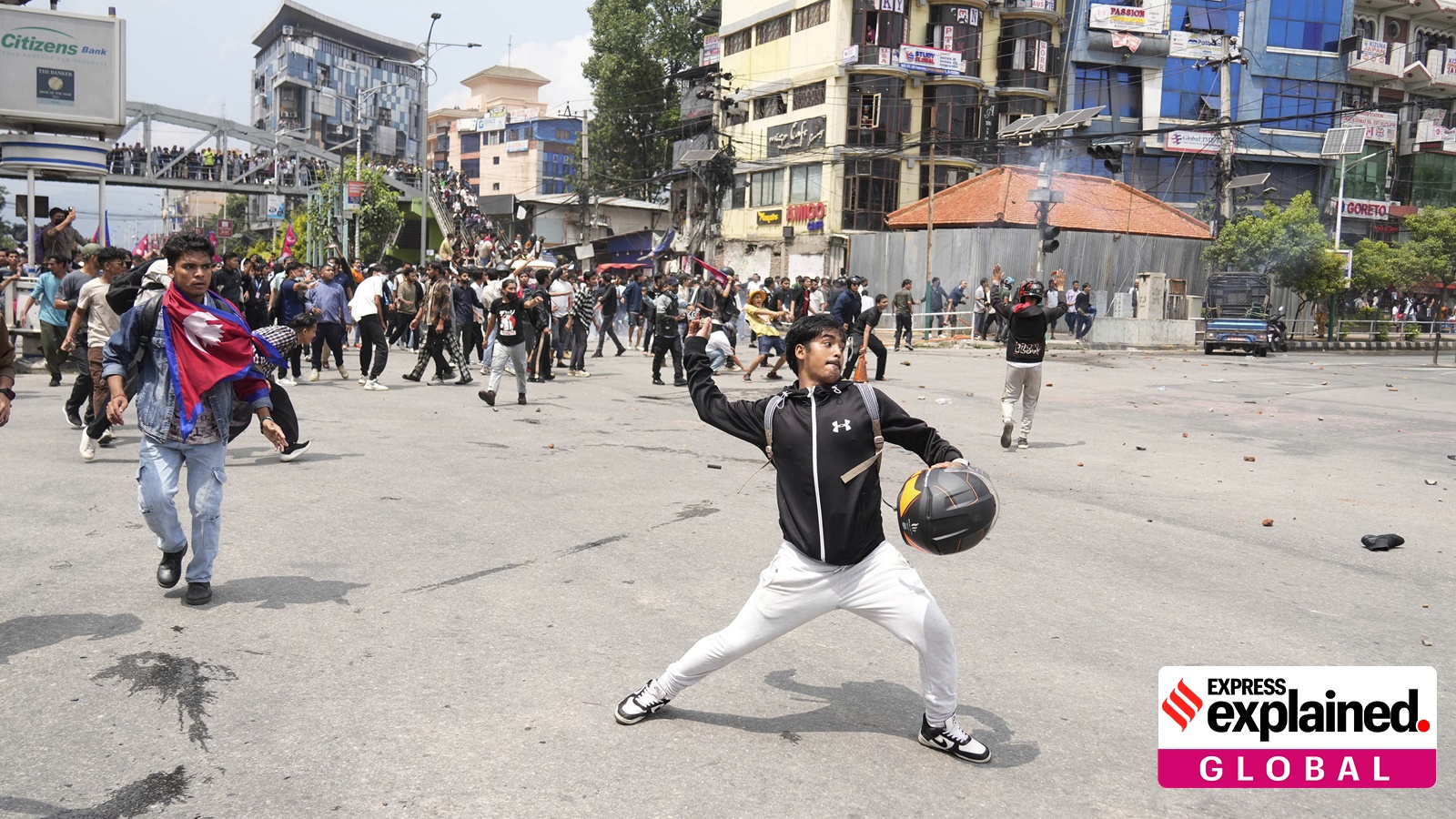

 Protesters surround an armored vehicle of a police during clashes outside the Parliament building in Kathmandu, Nepal, Monday, Sept. 8, 2025. (AP Photo)
Protesters surround an armored vehicle of a police during clashes outside the Parliament building in Kathmandu, Nepal, Monday, Sept. 8, 2025. (AP Photo)
